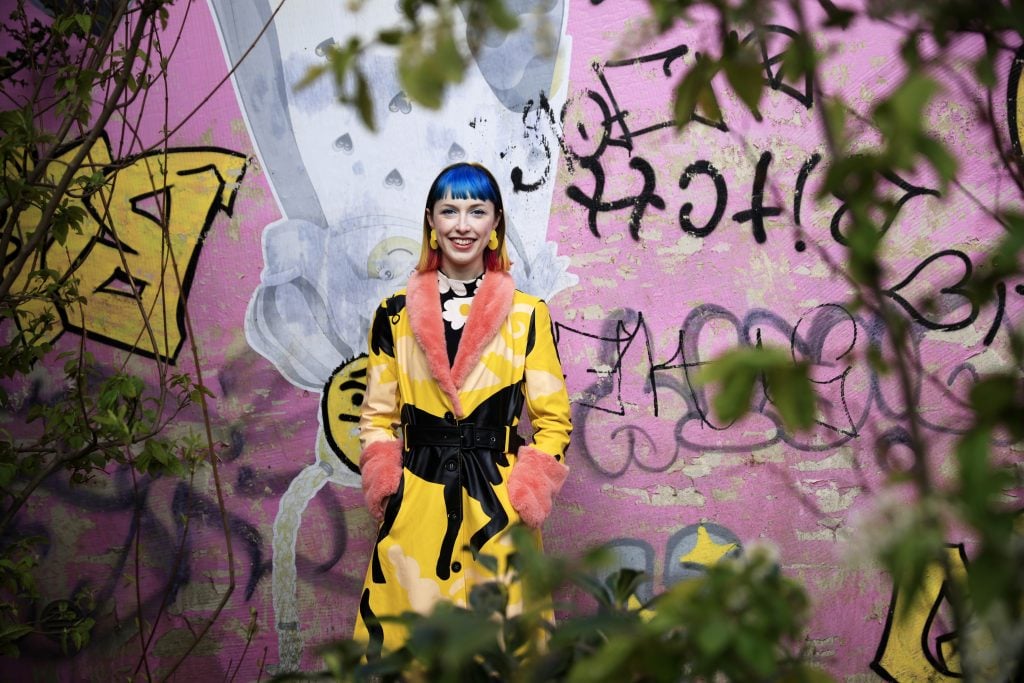I followed a trail of heart-shaped paving stones through the forest like breadcrumbs. At the end of the trail, a candy-hued storefront emerged from the foliage.
It’s the latest work by artist Rachel Maclean, unveiled last month at Jupiter Artland, the 120-acre sculpture park owned by collectors Nicky and Robert Wilson just outside of Edinburgh.
At first glance, the work is a toy store that beckons with a sense of magic. But on closer inspection, it’s more Grimm’s fairy tales than Walt Disney. The graffiti-covered storefront looks abandoned; inside, everything is upside down. (Even the second part of the work’s title, upside mimi ᴉɯᴉɯ uʍop is, yes, upside down.) The dolls on offer are eerie; one side a saccharine princess, the other a sinister döppelganger.
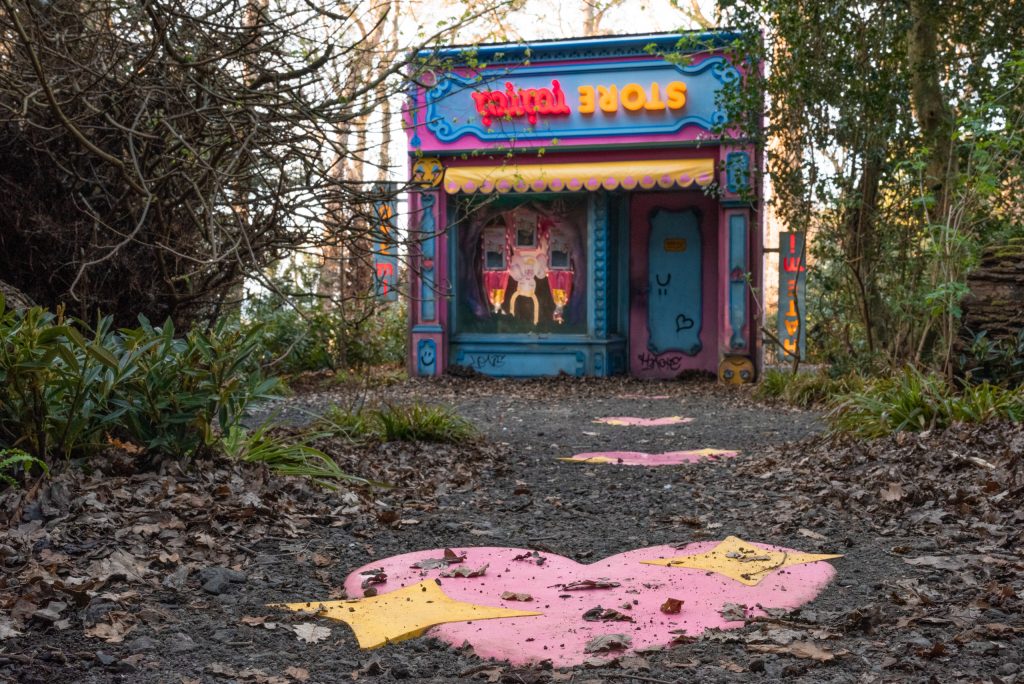
Rachel Maclean, upside mimi ᴉɯᴉɯ uʍop (2021). Photo by Amelia Claudia, courtesy Jupiter Artland.
The Scottish artist, who is known for her darkly satirical video works, built the installation to house a new film that follows a cartoon princess, Mimi, on a journey that evokes the pressures facing young adults in the 21st century. In 10 unsettling minutes, the animated film touches on crises of self-esteem; the stress of trying to brand oneself in an online world; the rapid cycles of consumerism and changing body ideals; and the dangers of predatory behavior online.
Nicky Wilson, the founder of Jupiter Artland Foundation, said she admired Maclean’s “fresh and frank approach” to issues facing contemporary society. To put it more bluntly, this work—like the rest of Maclean’s oeuvre—is bleak. (A “friendly” trigger warning on the way in states: “Despite its appearance, some of the works are unsuitable for young children. The film contains triggering and/or sensitive material about self-identity, self-harm, and body confidence.”)
The installation feels particularly prescient now, when the pandemic and accompanying financial crisis have shuttered commercial spaces around the world. (Maclean will design another iteration of the project to pop up in empty storefronts in towns across Scotland.) But the artist told me that was merely a coincidence. The idea was in fact three years in the making, and came from working with teenagers across Scotland through Jupiter Artland’s outreach program, Orbit.
“They talked about this idea of growing up in cities or towns where the shops were closed and this feeling of almost growing up in the remnants of something,” Maclean said. “It was very different to my experience growing up in the ’90s in this time of consumer capitalist boom, when everything was being built and there was a sense of newness. It seems that to be a young person today is to kind of grow up with this feeling that you’ve almost missed it.”
It is not difficult to relate the struggles of the Mimi character in the film with those facing any young person who must mediate the world through social media. Her handheld magic mirror is stand in for today’s smartphone, and if she wants to be the cutest in the land, the mirror expects her to look and act a certain way.
“You’d think that a medium which was so disembodied would allow you to kind of escape your body, and I guess that was kind of almost the utopian feminist idea of the internet when it started,” Maclean said. “But it’s almost had the opposite effect, to quite an intense degree, where bodies and physical bodies are seemingly more important than ever.”
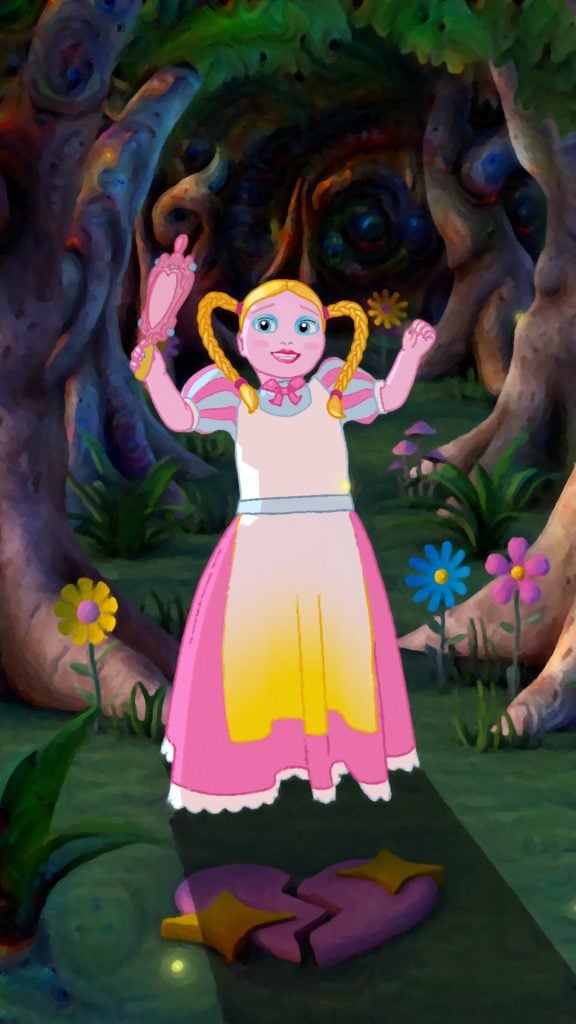
Rachel Maclean, upside mimi ᴉɯᴉɯ uʍop (2021). Animation still. Image courtesy the artist and Jupiter Artland.
Maclean grew up in the Scottish county of Clackmannanshire. Her parents were high school art teachers who encouraged her artistic talent from a young age. She graduated from Edinburgh College of Art in 2009. Her profile began to rise that same year, after she was included in “New Contemporaries,” the prestigious touring exhibition of emerging artists that has propelled to fame U.K. figures from David Hockney to Monster Chetwynd.
Now one of Scotland’s most prominent visual artists, who represented the country at the Venice Biennale in 2017, Maclean recognizes that she is privileged to have been able to make a career out of her work. All the same, she is not immune to the financial precarity of the industry—particularly as someone whose work is not designed to hang prettily over a sofa.
“As an artist you don’t get paid very often,” she said. “I have been very lucky to be paid for this, and Jupiter have been really brilliant. But it’s a big problem with public institutions in the U.K., either not paying artists or paying them very tokenistically, and it makes it very, very difficult to be an artist.”
The issue is not simply budget cuts, she added. “I think it comes down to some kind of culture where artists will work for free because they love their work, but I don’t think that galleries should exploit that.” She hopes to see this change as public institutions become more conscious of the systemic barriers to entry facing artists who don’t come from wealthy backgrounds.
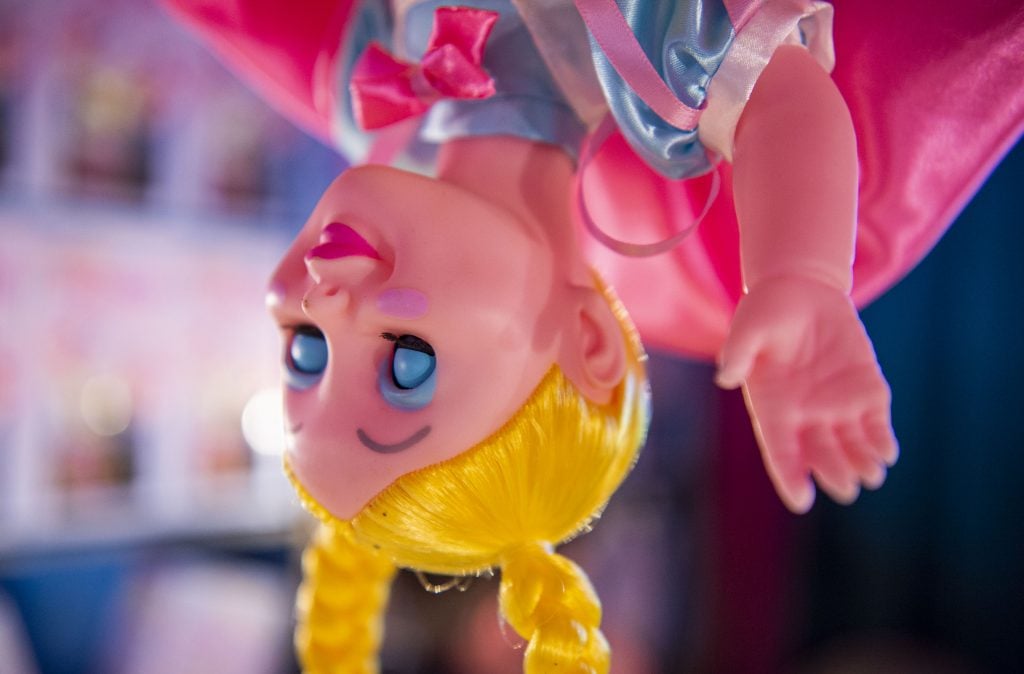
Rachel Maclean, upside mimi ᴉɯᴉɯ uʍop (2021). Photo by Lisa Ferguson, courtesy Jupiter Artland.
Until now, Maclean’s video work has taken the form of live action films in which she plays most of the characters herself, transformed through elaborate costumes, makeup, and digital trickery. The work at Jupiter Artland marks a departure as her first entirely animated video, which she worked with professional animators to create.
Working with animation is a very labor-intensive process, and Maclean explained that the decision was partly made out of necessity: lockdown had forced everyone to work remotely. “I think I would have made a live action film if it hadn’t happened,” she said.
Leaving creative control up to other people wasn’t an option. In order to show the animators how to get the movement just right, she shot herself performing the entire film on a green screen, and motion capture was the foundation for the cartoon.
While the new work will be permanently installed at Jupiter Artland, the institution is also hosting four of Maclean’s other films through July 18. They offer a kind of mini retrospective, including two rarely shown short films: a twisted kids program whose protagonist must grapple with the dark side of fame (Eyes to Me, from 2015) and a farcical infomercial for a cleaning product (Germs, from 2013).
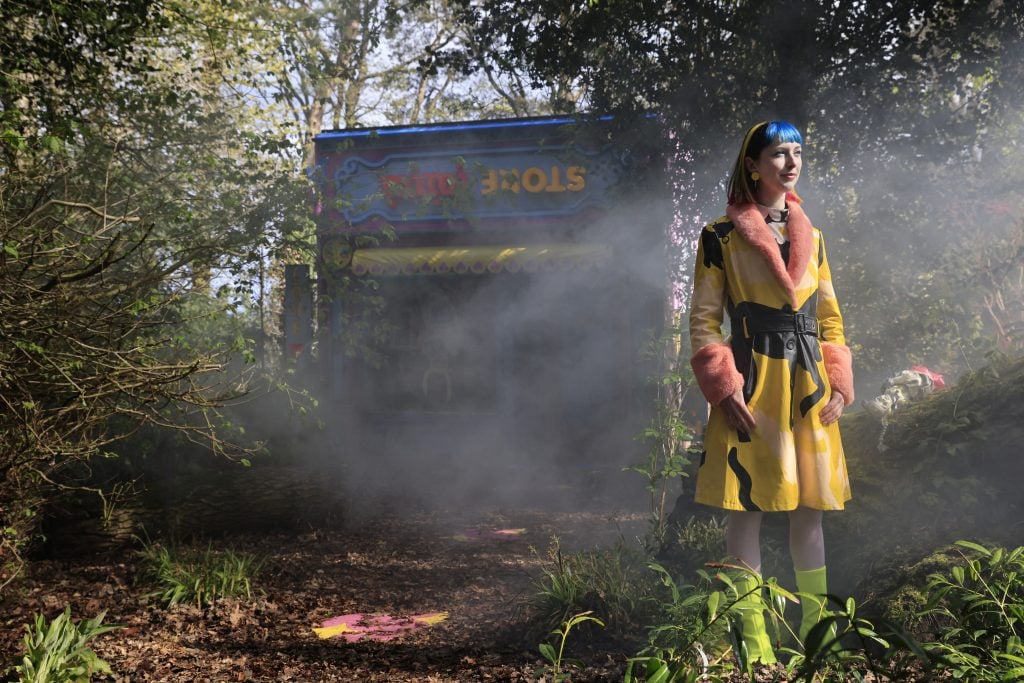
Rachel Maclean. Photo by James Glossop/ The Times Jupiter Artland.
Also on view was Maclean’s 2012 work commenting on Scottish independence and the crisis of the union, The Lion and the Unicorn, which was interesting to revisit ahead of the Scottish parliamentary elections last month.
Maclean hopes that the victory for pro-independence parties will lead to a rejection of problematic notions of Britishness that are connected to the former British empire. “It would do us a lot of good if we were to deal with that history via finding… a more progressive national identity to attach to,” she said. “That’s the opportunity that Scotland has with independence.”
Finally, Maclean was showing Spite Your Face, the post-truth dystopian tale she created for the Venice Biennale. The work, now owned by Jupiter, was conceived in response to the political environment that led to Brexit vote and the rise of Donald Trump, but takes on a new resonance during the pandemic.
“I like that the work changes every time you show it,” Maclean said. She hopes her first permanent installation will similarly strike visitors differently as it decays further and further into the woodland.
